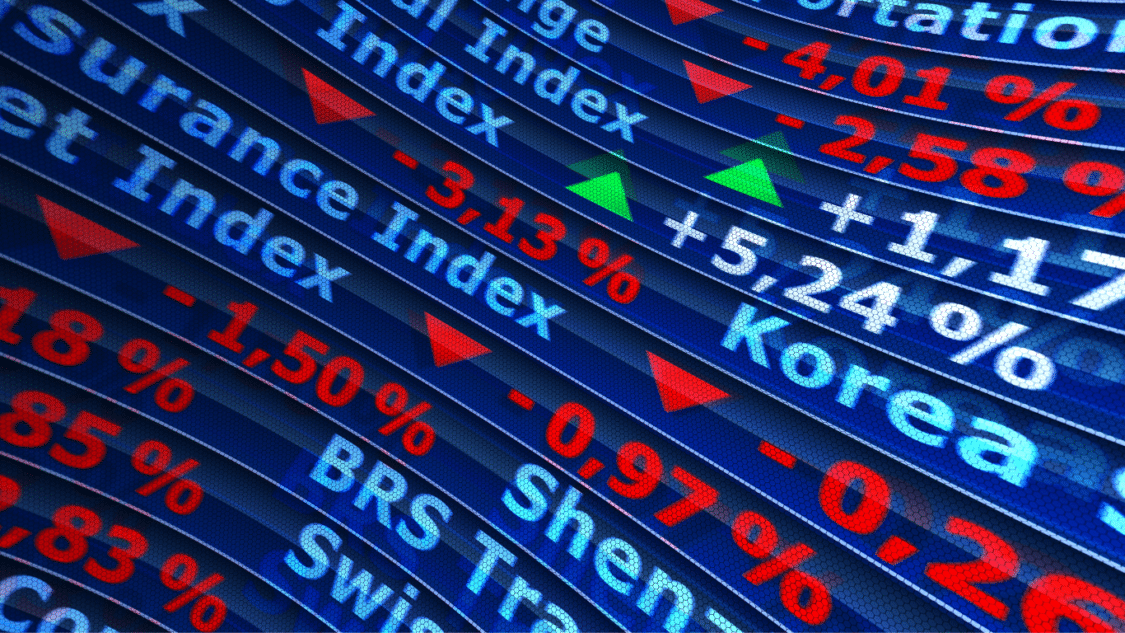The FTSE index, or the Financial Times Stock Exchange index, is a benchmark index that tracks the performance of the most popular companies listed on the London Stock Exchange. Investors, traders, and financial analysts worldwide watch the FTSE index closely as a barometer of the UK economy. The FTSE index is closely watched by investors, traders, and financial analysts worldwide.
In this article, you will find a comprehensive explanation of the FTSE index. This includes its history, calculation methodology, components, significance in the financial world, performance trends, investment strategies, and a comparison with other major indices. Whether you’re a seasoned investor or a newcomer to the world of finance, this guide will leave you with the knowledge needed to navigate the ever-changing landscape of the UK stock market.
What is the FTSE Index?
The FTSE index is a stock market index that measures the activity, trends, and ongoing performance of some of the largest companies on the London Stock Exchange. It was created in 1984 by the Financial Times and the London Stock Exchange Group, and its name is derived from the initials of these two organisations. The index is widely recognised as a barometer of the UK economy, providing investors with a minimal perspective of the health and direction of the market. With its diverse range of sectors and industries, including finance, energy, healthcare, and technology, the FTSE index offers a comprehensive snapshot of the UK market.
The FTSE index is market-capitalisation weighted, meaning that the companies with the highest market value have a greater impact on the index’s movements. This weighting methodology ensures that larger companies significantly influence the index’s performance, reflecting their overall importance in the UK economy. The index is calculated in real-time throughout the trading day, allowing investors to track the market’s performance and make informed decisions.
History and Background of the FTSE Index
The index has a rich history that dates back to its inception in 1984. The idea behind creating the index was to provide investors with a benchmark that accurately reflects the performance of the UK stock market. Before the FTSE index, various indices were in use, but they lacked the comprehensive coverage and transparency that the FTSE index offered.
Over the years, this index has evolved and expanded its coverage. In 1995 the FTSE 100 index was introduced, consisting of the 100 largest companies on the London Stock Exchange. This index quickly gained popularity and became widely recognised as a key indicator of the UK market’s performance. In addition to the FTSE 100, other indices within the FTSE family, such as the FTSE 250, FTSE SmallCap, and FTSE All-Share, track companies of different sizes within the UK market.
How is the FTSE Index Calculated?
The index is calculated using a complex methodology that considers the market capitalisation of its constituent companies. A company’s market capitalisation can be calculated through dividing its share price to the total number of outstanding shares. The total market capitalisation of all the companies in the index is then divided by a number called the index divisor, which ensures that the index is comparable over time.

The index divisor is adjusted periodically to maintain the continuity of the index. This adjustment takes into account various factors, such as stock splits, rights issues, and changes in the number of shares outstanding. By adjusting the index divisor, the index remains representative of the UK market and allows meaningful comparisons of its performance over time.
It’s important to note that the FTSE index is reviewed quarterly, during which the constituent companies are reassessed to ensure they still meet the index’s eligibility criteria. Companies that no longer meet the criteria may be eliminated from the index, while new companies that meet the criteria may be added. This regular review process helps to ensure that the FTSE index remains relevant and accurately reflects the composition of the UK market.
Components of the FTSE Index
The index comprises various companies from various sectors and industries. The index includes companies from sectors such as finance, energy, healthcare, technology, consumer goods, and many others. This broad representation of sectors and industries exposes investors to different segments of the UK economy.
The FTSE index is dominated by large multinational companies, many of which are household names. These companies significantly impact the index’s movements and are closely watched by investors. Some of the companies that make up the FTSE index include HSBC Holdings, BP, GlaxoSmithKline, Unilever, and Vodafone Group, to name just a few.
It’s worth noting that the index is weighted by market capitalisation, meaning that larger companies significantly influence the index’s performance. This weighting methodology ensures that the index accurately reflects the relative importance of different companies within the UK market.
Importance of the FTSE Index in the Financial World
The FTSE index plays a crucial role in the financial world, serving as a key indicator of market trends and investor sentiment. It provides a view of the overall health and direction of the UK stock market, helping investors, traders, and financial analysts make informed decisions.

One of the FTSE index’s primary uses is as a performance measurement benchmark. Many investment funds, such as index funds and exchange-traded funds (ETFs), track the performance of the FTSE index. By investing in these funds, investors can gain exposure to the broader UK market and aim to achieve returns that closely mirror the index’s performance.
In addition to being a performance benchmark, the FTSE index is also used as a basis for derivatives, like futures and options contracts. Investors can use derivatives to either speculate on the future movements of an index or hedge their current positions. The availability of these derivatives enhances the liquidity and efficiency of the market, providing investors with additional opportunities to manage risk and generate returns.
Furthermore, international investors and financial institutions closely follow the FTSE index. Its performance and trends can significantly impact global markets as investors around the world adjust their investment strategies based on the index’s movements. The FTSE index’s influence extends beyond the UK, making it a vital reference point for global investment decisions.
FTSE Index Performance and Trends
The performance of the index is closely monitored by investors and financial analysts, offering information on the general well-being of the stock market in the United Kingdom. Various factors influence the index’s performance, including macroeconomic indicators, company earnings reports, geopolitical events, and investor sentiment.
Over the years, the FTSE index has exhibited both moments of growth and periods of decline. Its performance is subject to market cycles and can be affected by various factors, such as economic recessions or global financial crises. Investors analyse the index’s past performance and trends to locate investment opportunities and mitigate risk.
It’s important to note that the FTSE index can be volatile, with daily fluctuations influenced by many factors. Short-term movements in the index may not necessarily reflect the market’s long-term trends. Therefore, investors are encouraged to take a long-term view when analysing the index’s performance and making investment decisions.
Investing in the FTSE Index
Investing in the FTSE index can be done through various avenues, depending on individual preferences and investment goals. One commonly used investment approach is to invest in index funds or ETFs that mirror the performance of the FTSE index. Investors can gain exposure to the broader UK market through these funds, which provide a diverse portfolio of stocks that closely reflect the index’s composition.

Another option for investing in the FTSE index is through individual stock investments. By carefully selecting companies within the index that align with their investment strategy, investors can build a portfolio that aims to outperform the index. This approach requires more extensive research and analysis, as investors need to evaluate individual companies’ fundamentals and prospects.
Investors can also consider derivative products, such as futures and options contracts, to gain exposure to the FTSE index. These products allow investors to contemplate the index’s future movements or hedge their positions. However, trading derivatives involves additional risks and requires a good understanding of the market dynamics. Investors must consider risk tolerance, investment objectives, and time horizon when deciding on the most suitable approach for investing in the FTSE index.
Trading Strategies for the FTSE Index
Trading the FTSE index requires a well-defined strategy and an understanding market dynamics. Here are a few commonly used trading strategies for this index:
- Trend following: This strategy involves identifying the prevailing trend in the index and taking positions in line with that trend. Traders strive to take advantage of the market’s momentum by purchasing stocks when the index is rising and selling them when it’s falling.
- Mean reversion: In this strategy, traders take advantage of short-term deviations from the index’s average price. When the index moves from its average, traders take positions expecting it to revert to the mean. This strategy requires careful monitoring of the index’s price movements and identifying potential turning points.
- Breakout trading: Traders use this strategy to capture significant price moves in the index. They look for price breakouts above resistance or support levels, signalling a potential trend continuation. Breakout traders often use technical indicators and chart patterns to identify these breakout opportunities.
- News-based trading: This strategy involves trading the FTSE index based on news and events that can impact the market. Traders closely monitor economic releases, company earnings reports, geopolitical developments, and other news that can influence the index’s performance. By reacting quickly to news and events, traders aim to profit from short-term price movements.
As a trader, creating a trading plan, establishing clear entry and exit points, and efficiently managing risk while executing these tactics are essential. Regularly monitoring the index’s performance and staying updated with relevant news and events are also crucial for successful trading.
FTSE Index vs Other Major Indices
The FTSE index is just one of many benchmark indices that exist globally. Other major indices include the S&P 500 in the United States, the DAX in Germany, and the Nikkei 225 in Japan. Each index represents the respective country’s stock market’s performance and has unique characteristics.
Compared to other major indices, the FTSE index offers exposure to the UK market, known for its global financial hub, diverse sectors, and multinational companies. The FTSE index’s composition reflects the UK’s economic structure, with significant weightings in financial services, energy, and pharmaceuticals, among other sectors. This composition can attract investors looking for exposure to these particular sectors or seeking geographical diversification.
However, it’s important to note that each index has strengths and weaknesses. When comparing various indices and making investment decisions, investors must consider their investment objectives, risk tolerance, and geographical preferences. Diversification across multiple indices and global markets can help mitigate risk and potentially enhance returns.
Conclusion
The FTSE Index is a benchmark for monitoring the progress of the biggest companies listed on the London Stock Exchange. As a widely recognised barometer of the UK economy, the FTSE index is crucial in guiding investment decisions and shaping financial strategies.
In this comprehensive guide, we have explored the intricacies of the index, including its history, calculation methodology, components, importance in the financial world, performance trends, investing strategies, and a comparison with other major indices.
By deeply understanding the index and its dynamics, you can make more informed investment decisions, manage your risk effectively, and potentially achieve your financial goals. Stay updated with the latest market trends, seek professional advice when needed, and continuously educate yourself to stay ahead in finance.
This index is a powerful tool that can help you unlock opportunities in the UK stock market and build a successful investment portfolio, including its history, calculation methodology, components, importance in the financial world, performance trends, investing strategies, and a comparison with other major indices. Whether you’re a seasoned investor or a newcomer to the world of finance, this guide will give you the knowledge needed to navigate the ever-changing landscape of the UK stock market.

